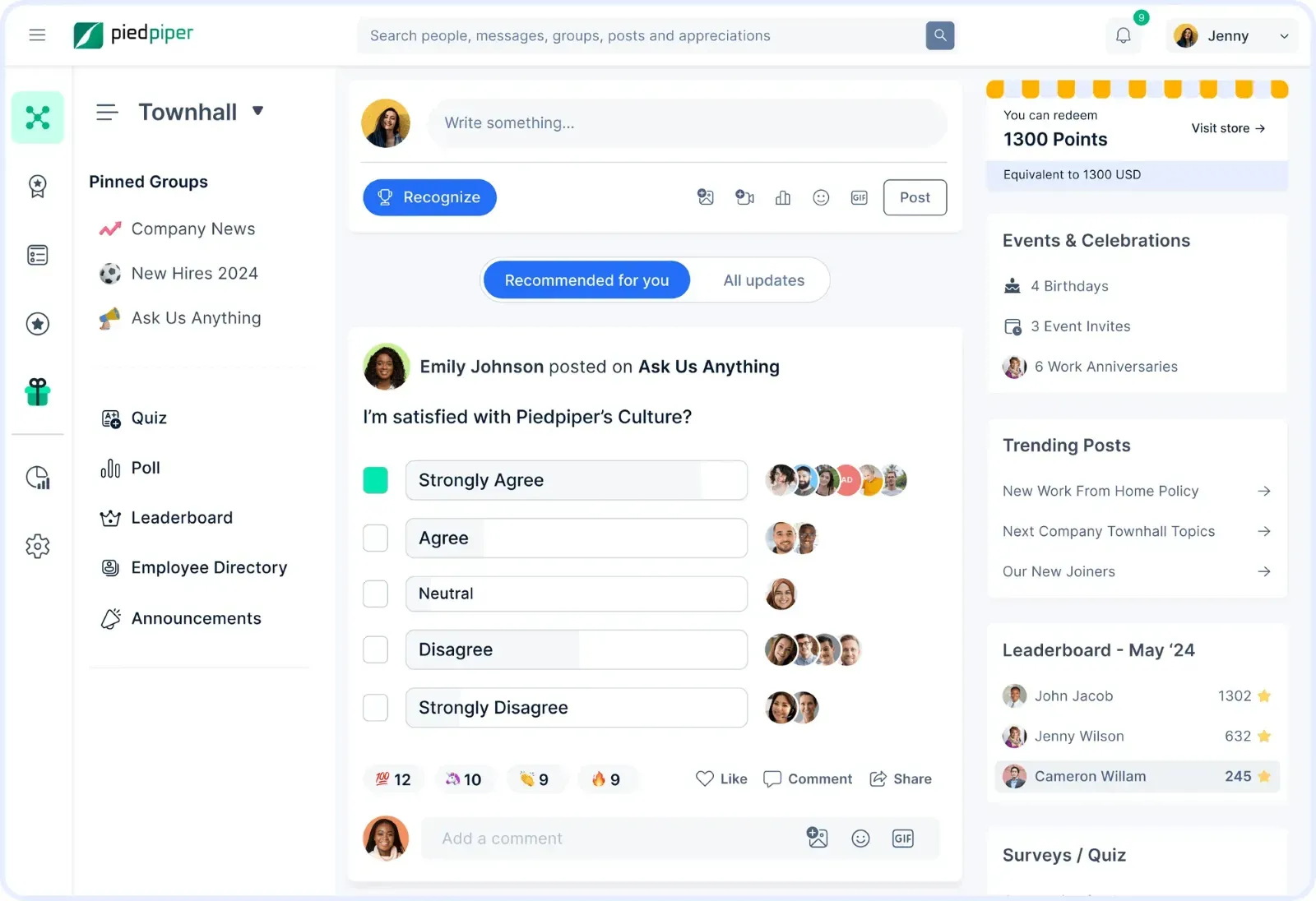How to Manage Your Boss Effectively: 12 Proven Strategies for Better Communication and Career Growth
Learn how to manage your boss with 12 actionable strategies to improve communication, support leadership, and accelerate your own career growth.
On this page
We all understand that building our careers is our responsibility. However, over the course of our professional lives, we often push the onus of our growth onto others—usually our bosses. Managing up—or learning how to manage your boss—is a concept that urges us not to rely on external agents and instead take control of our career paths.
But I see even further significance in this idea. Successfully managing up is essential for anyone looking to grow in their role. It brings the focus back to vital factors for success and helps us learn how to manage conflict with your boss constructively.
"When you have a micromanager [or any other stereotypical] boss, we can either complain about it and get all bitter, or we could decide actually to give that boss what they want." – Mary Abbajay
I also believe that managing up helps drive the significance of collaboration within a team or between a boss and their team member. Employees who are good at managing up are in constant touch with their bosses for updates and reviews- generally over an organizational communication tool like Empuls.
Well maybe, it's time that we realize that it's not just the employees who need support and guidance - our bosses do too. The concept can only work if there is a certain level of trust and transparency between the boss and the employee.

A study of executive turnover in the top 1,000 U.S. companies shows how managing bosses is a challenge for executives. The annual turnover among senior executives seems to increase dramatically when the new CEO - especially from outside the firm, joins - showing how significant ‘Managing up’ is.
As humans, we get attuned not to seek help from those who show dependency on us. Managing up allows us to become more human and work together for mutual benefits and in the more significant interest of the organization.
What is managing up?
Managing up means taking responsibility for your professional growth by building a strong working relationship with your boss. It’s not about manipulation—it’s about understanding how to support your manager while ensuring your own success. In simple terms, it’s learning how to manage your boss in a way that helps both of you succeed.
Instead of waiting for feedback or direction, managing up encourages you to take initiative, communicate effectively, and create mutual trust. It’s especially useful if you're trying to figure out how to manage conflict with your boss or if you’re working under a micromanager or an unpredictable leader.
Why is it important to manage up?
Learning how to manage up your boss gives you control over your career. It helps you build better communication, develop leadership skills, and improve collaboration. When done right, managing up makes it easier to:
- Get clarity on expectations
- Work on meaningful projects
- Reduce misunderstandings
- Resolve issues early
- Create a healthy, respectful work environment
Managing up also shifts your mindset. You begin to see your boss not just as a supervisor, but as a partner. When your boss succeeds, you succeed too. That is why we have shared 10 effective tips to manage up your manager.
How to manage your boss in an effective way?
Explore these seven smart ways to manage your boss:
1. Learn about your boss
For any relationship to be cordial, the involved parties must understand each other and know each other as the people they are. The same applies here. Put in the effort to understand your boss, what they are good at, where their vulnerabilities lie, or when they naturally seek assistance.
In short, about their personality traits – the good and the not-so-good! This awareness will prepare you to deal with them amicably and help them more deeply. That said, ensure that your boss does not perceive your offer of help and support as 'stepping on them' or as an intent to out-show them. Having a quick one-on-one catch-up chat over office communication tools like Empuls can help nurture such a relationship.
2. Maintain and strengthen your relationship
There is much trust that goes into making and managing work successfully. If you know a great deal about your boss, it puts a big responsibility on you to not misuse any of this information. Build trust, credibility, and dependency but acknowledge the presence of your boss in the hierarchy. Make sure not to cross the line.
Remember - managing up is not showing down the boss but helping them develop your skills.
3. Know your boss's KRAs
Why? Because your KRAs are derived from your boss's KRAs, and theirs from that of the organization. This knowledge ensures that all the efforts are synchronized and heading in the same direction.
With deliverables lined up, having a clear sight of priorities will be a blessing. A team channel to discuss team and individual KRAs over engagement platforms like Empuls can ensure that you and your entire team are on track with collective KRA progress.
4. Maintain adequate communication
Whether it is good news or bad – keep them informed. Client escalations, change in the delivery dates, revision in expected results, all of it. There can't be anything as wrong as being blindsided.
Not knowing the critical matter under discussion can jeopardize your boss's work dilute their credibility, and surely you wouldn't want to be the reason for all that to happen.
Build a relationship with your boss, ensure you keep them informed in time to face the situation, and appear to be informed. An Empuls workgroup is the best, non-invasive way to update your boss and keep your team informed on the progress of your tasks.
5. Offer support as needed
It is essential that you know or can anticipate the need at your boss's end for this to happen. Be prepared to offer support. Remember, timely assistance goes a long way. It says a lot about your ability to think quickly, act swiftly with a keen eye for detail, and right use of common sense.
6. Pick additional responsibilities
Own your work and do your first task right. This task can be discussed with your boss and would add great support. It also talks a great deal about the sense of accountability at your end.
Meanwhile, make sure that your regular tasks are complete. It will be unfair to wait for follow-up or reminders to complete your previously defined tasks.
Additionally, planning will allow you to pick some additional assignments which can enhance your learning curve, expose you to knowledge, and provide real-time experience.
Be it a presentation or a proposal, take the initiative and try your hands on it.
7. Be your boss's mentor
Sounds big, right! We all agree that bosses evaluate their team's strengths and assign tasks best suited to an individual's strengths. For the areas of development, they do everything from mentoring to getting you nominated for training.
Reciprocating is an excellent way to contribute to your boss' success by helping them analyze themselves, capitalize on strengths, and work on areas of improvement. It would be a great gesture to work with them in the areas they lack, which forms an integral part of managing your boss.
“Leadership is all about perception; if leaders do not know how they are perceived, their performance will suffer.” - John Baldoni, Author of Lead Your Boss: The Subtle Art of Managing Up
8. Be genuine
Have the right intentions to help your boss and at the same time gain learning exposure and strengthen your relationship. Be unadulterated when giving advice. Create proper dependency. Focus on the long-term benefit of this association and don't get lured with short ones and hamper your brand name.
9. Adapt to their working style
Pay attention to how your boss prefers to communicate—email, meetings, messages—and match their style. If they like concise updates, don’t send long reports.
Understanding how they work saves time, avoids frustration, and builds a smoother workflow.
10. Anticipate their needs
If you know what’s coming, you can prepare in advance. Try to think two steps ahead—whether it’s a report they might need or a status update they’ll ask for.
This shows initiative and that you’re dependable when it counts.
11. Share solutions, not just problems
When issues arise, don’t just bring the problem—bring possible solutions too. It eases their decision-making process and shows that you’re proactive.
This kind of thinking is key when figuring out how to manage conflict with your boss.
12. Respect their time
Be mindful of their schedule. Keep meetings efficient, emails clear, and only escalate when truly needed. Show that you value their time as much as your own.
Over time, this builds respect and positions you as someone they can count on.
How Empuls helps with managing your boss

Empuls empowers employees to stay aligned, communicate effectively, and foster transparency with their managers. With features like:
- One-on-one chat threads for seamless updates and check-ins
- Team channels for sharing KRAs, progress, and feedback
- Pulse surveys to gauge team dynamics and improve collaboration
- Task recognition and feedback tools to appreciate efforts and build trust
Empuls helps create a culture of open communication, mutual respect, and continuous alignment—all essential to managing up successfully.
Wrapping up
Wouldn't it be wonderful to have a healthy working relationship based on mutual admiration, learning, and beneficial dependency?
Each day is full of promising opportunities that allow you to propel not only forward but also genuinely contribute to the progress of your boss' mental health and career. After all, when they move forward, you move forward. Make your succession plan. Take control of your career progress. Build strong relationships, get the leaders to recommend you for THAT dream role.
Helping your boss succeed will help you accelerate your learning and growth!
👉 Start managing up better with Empuls. Book a free demo now!
FAQs
Q1: How do you manage a difficult boss?
- Understand their management style and adapt your communication accordingly.
- Be proactive by anticipating their needs and offering solutions instead off problems.
- Maintain professionalism, focus on delivering results, and avoid unnecessary conflicts.
- Document interactions if issues persist to protect yourself and provide clarity.
Q2: How do you professionally correct your boss?
- Choose the right time and setting—never in public or during high-stress moments.
- Be respectful and tactful; start with a compliment or positive framing before addressing the issue.
- Use indirect methods for minor errors, like asking clarifying questions or passing a discreet note.
- For significant mistakes, request a private conversation and present the correction as constructive feedback.
Q3: What is a toxic boss?
A toxic boss exhibits aggressive behavior, uses intimidation or insults, and creates a hostile work environment. They may manipulate employees, micromanage excessively, or undermine their subordinates' confidence. This behavior often leads to fear, resentment, and poor morale among team members.
Q4: How do you talk to a difficult boss?
- Prepare thoroughly by identifying the issue, possible solutions, and your desired outcome.
- Approach them with respect and a solution-oriented mindset. Use phrases like "I’d like to share something you might not have noticed" to frame the conversation positively.
- Stay calm, professional, and focused on facts rather than emotions during the discussion


















